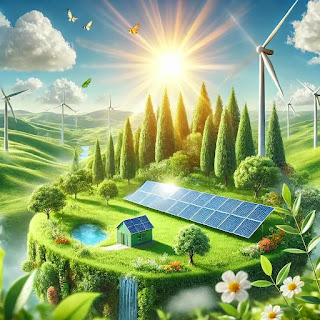As global conflicts intensify, their effects on renewable energy and climate have become a pressing concern. Understanding these dynamics is critical for shaping sustainable policies and addressing the interconnected challenges of war, energy security, and environmental preservation. This article delves into the dual impacts of wars on renewable energy and climate, highlighting opportunities to build a resilient and sustainable future.
The Negative Impact of Wars on Renewable Energy
Destruction of Renewable Energy Infrastructure
Conflicts often result in the direct destruction of renewable energy facilities, such as solar farms and wind turbines. For instance, the war in Ukraine has caused significant damage to energy grids, delaying efforts to transition to cleaner power sources.Diversion of Resources
Resources that could fund renewable energy projects are frequently redirected toward military spending and emergency relief efforts. This shift slows the development of critical green energy initiatives.Displacement of Talent
Wars force scientists, engineers, and technicians to flee conflict zones, disrupting the renewable energy sector. For example, ongoing conflicts in regions like the Middle East have led to brain drains, weakening local capacity for green energy development.
How Wars Affect Climate Change
Increased Carbon Emissions
Wars are significant contributors to greenhouse gas emissions, with military vehicles, weaponry, and energy-intensive operations fueling the problem. Recent conflicts have shown sharp rises in emissions tied to military activities.Environmental Degradation
Beyond emissions, wars destroy ecosystems, from deforestation to the pollution of water bodies, exacerbating climate vulnerabilities in affected regions.Disruption of Global Climate Goals
Political instability from wars undermines international climate commitments, such as those outlined in the Paris Agreement, as nations prioritize immediate survival over long-term sustainability.
Opportunities Amidst Conflict
Innovation in Energy Independence
Conflicts often expose the vulnerabilities of fossil fuel reliance. For instance, Europe’s response to the energy crisis during the Russia-Ukraine war saw accelerated investments in renewable energy as countries sought energy independence.Localized Clean Energy Solutions
In regions affected by war, small-scale renewable solutions like solar-powered microgrids can provide essential energy while reducing reliance on centralized fossil fuel infrastructure.Global Collaboration for Sustainable Reconstruction
Post-war reconstruction provides a unique opportunity to integrate renewable energy technologies. Rebuilding destroyed infrastructure with green energy can lay the foundation for a sustainable future, as seen in discussions around Ukraine’s recovery plans.
Actionable Steps for a Sustainable Future
Protect Renewable Energy Infrastructure
International agreements should prioritize safeguarding renewable energy facilities in conflict zones as critical assets for both humanitarian needs and climate goals.Promote Green Reconstruction
Governments and international organizations must include renewable energy at the core of reconstruction efforts, ensuring that rebuilding efforts align with climate commitments.Strengthen Resilience Through Decentralized Energy
Encouraging decentralized energy systems, like off-grid solar, can help conflict-affected regions maintain energy access while reducing environmental impact.
Why This Matters Now
With global tensions on the rise and the climate crisis becoming more urgent, understanding the link between wars, renewable energy, and climate is crucial. The lessons learned from current conflicts, such as those in Ukraine and the Middle East, underline the importance of aligning energy and climate policies with the realities of a volatile world.
Conclusion
Wars present immense challenges to renewable energy and climate goals, but they also offer opportunities to rethink global energy systems. By prioritizing green reconstruction and fostering innovation, the international community can turn crises into catalysts for a cleaner, more sustainable future.
Keywords:
- Impact of wars on renewable energy
- Climate change and wars
- Renewable energy in conflict zones
- Energy independence during wars
- Green reconstruction post-conflict
- Ukraine energy crisis
- Sustainable energy solutions during wars
Topics:
- The role of renewable energy in Ukraine’s recovery
- How global conflicts affect the Paris Agreement
- Innovative clean energy solutions for war zones


